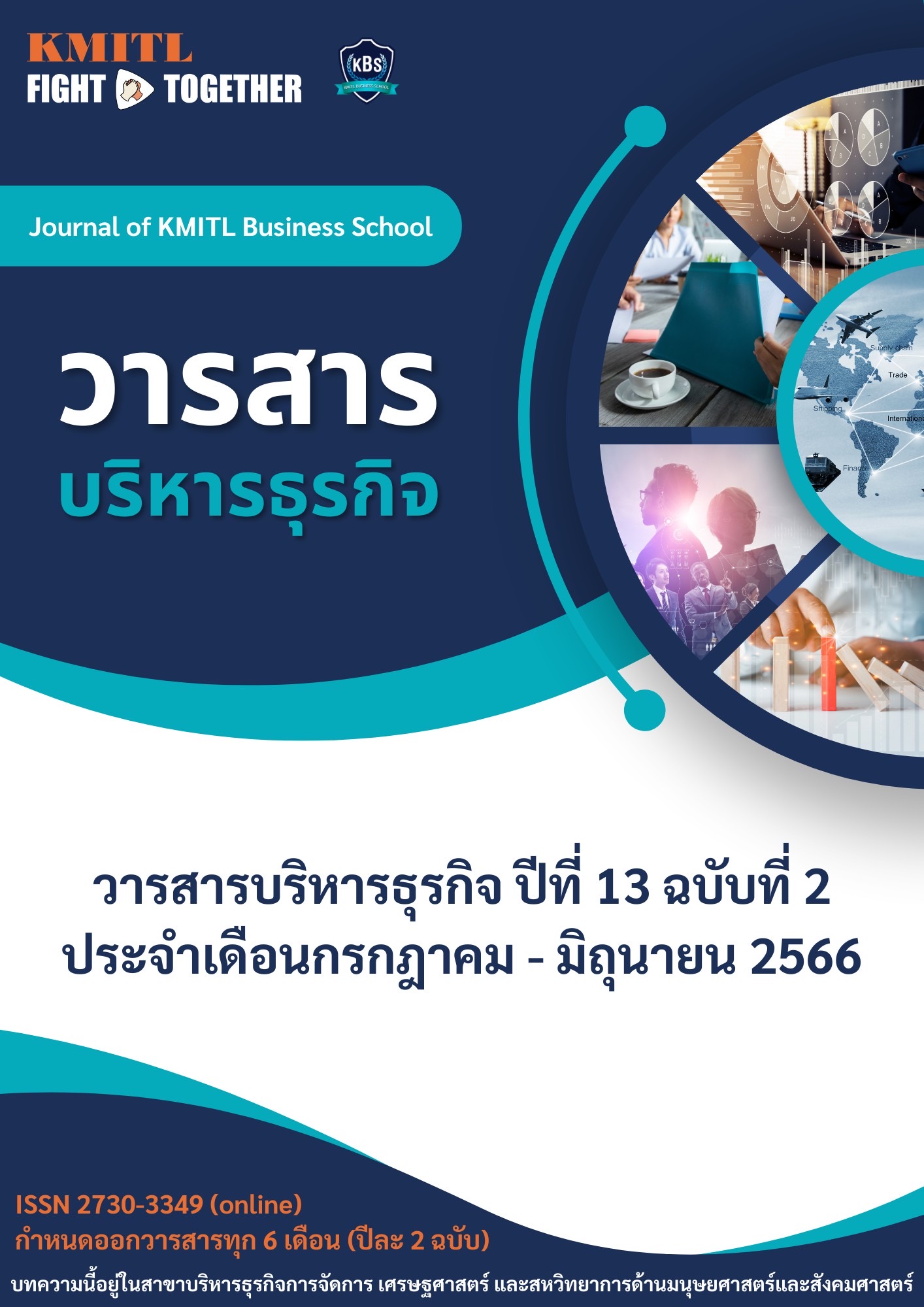Using behavior of utensil sterilizers among users in Eastern Thailand's food courts
Main Article Content
Abstract
The objectives of this research were 1) to study the users’ behaviors on the use of utensil sterilizers at food courts in the eastern part of Thailand, 2) to compare the users’ behavior on the use of utensil sterilizers at food courts in the eastern part of Thailand, categorized by demographic characteristics, and 3) to investigate the confidence factors that influence the users’ behaviors on the use of utensil sterilizers at food courts in the eastern part of Thailand. The research sample consisted of 400 users of utensil sterilizers at food courts in the eastern part of Thailand. All participants have used utensil sterilizers at least once in the past three months at a food court, where established in department stores, hospitals, universities, and factories. Descriptive statistics, including frequency, percentage, mean, and standard deviation were employed to analyze the data. In addition, inferential statistics, that include T-tests, one-way analysis of variance, and multiple linear regression analysis, were then applied. The results revealed that differences in age, educational level, occupation, and average monthly income associated with the frequency of the use of utensil sterilizer. Furthermore, confidence factors affecting the frequency of the usage were physical and usability aspects. In light of these findings, service providers seeking to increase the usage of utensil sterilizers should consider product development, that encompasses the aspects of usability, appearance, size, weight, and price. Additionally, strategic marketing initiatives should be designed to target different groups of users and promote the benefits of using these utensil sterilizers. This approach aims to raise awareness, understanding, and the significance of employing these devices.
Article Details

This work is licensed under a Creative Commons Attribution-NonCommercial-NoDerivatives 4.0 International License.
Journal of KMITL Business School is available both online and in printed version.
**All articles or opinions presented in this issue of the Journal of KMITL Business School reflect the thoughts of their respective authors. This journal serves as an independent platform for a variety of viewpoints. Authors bear full responsibility for the content of their articles.**
**All articles published in this journal are copyrighted by KMITL Business School, King Mongkut's Institute of Technology Ladkrabang. The editorial team permits copying or using articles, but a reference to the journal is required.**
References
กรมควบคุมโรค. (2566, 8 มีนาคม). ประกาศกรมควบคุมโรค เรื่อง การป้องกันโรคและภัยสุขภาพ ที่เกิดขึ้นในช่วงฤดูร้อนของประเทศไทย พ.ศ. 2566.
สำนักงานปลัดกระทรวงสาธารณสุข. (2565). จำนวนผู้ป่วยใน (หลักประกันสุขภาพถ้วนหน้า และสวัสดิการรักษาพยาบาลข้าราชการและครอบครัว) รวมทุกการวินิจฉัยโรค จำแนกตามเพศและโรค/กลุ่มโรค 298 โรค ตามบัญชีจำแนกโรคระหว่างประเทศ ฉบับแก้ไข ครั้งที่ 10 ทั่วราชอาณาจักร พ.ศ. 2560 - 2564. [ออนไลน์], เข้าถึงได้จาก: http://statbbi.nso.go.th/staticreport/page/sector/th/05.aspx. (2566, 15 เมษายน).
กฎกระทรวง เรื่อง สุขลักษณะของสถานที่จำหน่ายอาหาร พ.ศ. 2561. (2561, 20 มิถุนายน). ราชกิจจานุเบกษา. เล่ม 135 ตอนที่ 42 ก. หน้า 19-25.
พรรณราย อินทุรัตน์. (2563). ความพึงพอใจต่อการปรับตัวศูนย์อาหารในมุมมองผู้บริโภคช่วงสถานการณ์โควิด – 19 ศึกษาเฉพาะกรณี ธุรกิจการค้าในจังหวัดพิษณุโลก. วิทยานิพนธ์ บริหารธุรกิจบัณฑิต บัณฑิตวิทยาลัย มหาวิทยาลัยนเรศวร.
ศูนย์วิจัยกสิกรไทย. (2565). ธุรกิจจัดส่งอาหารไปยังที่พักปี 2566 อาจหดตัว ท่ามกลางโจทย์ท้าทายในการรักษายอดขายของผู้ให้บริการแพลตฟอร์ม Food Delivery. [ออนไลน์], เข้าถึงได้จาก: https://www.kasikornresearch.com/th/analysis/k-econ/business/Pages/Food-Delivery-z3371.aspx. (2566, 15 เมษายน).
Vioteche Page. (2564). VIOTECHE VIO (เครื่องอบช้อนยูวี). [ออนไลน์] เข้าถึงได้จาก: http://www.dkhthailand.com/14453176/vioteche-vio-เครื่องอบช้อนยูวี. (2566, 27 มีนาคม).
วชิรวัชร งามละม่อม. (2558). แนวคิด และทฤษฎีที่เกี่ยวกับลักษณะทางประชากรศาสตร์2016.
http://learningofpublic.blogspot.com/2015/09/blogpost_11.html.
ศิริวรรณ เสรีรัตน์ และคณะ. (2560). การบริหารการตลาดยุคใหม่: (Marketing Management) ฉบับปรับปรุงใหม่. กรุงเทพฯ: Diamond In Business World.
Morgan., & Hunt. (1994). The Commitment - Trust Theory of Relationship Marketing. Journal of Marketing Management (58 JULY), 20-30.
Stern, B. B. (1997). Advertising intimacy: Relationship marketing and the services consumer. Journal of Advertising, 26 (4), 7-19.
Parasuraman, A. Zeithaml, and A. Berry. (1988). Delivery Quality Service: Balancing Customer Perceptions and Expectations. New York: Free.
Pomponi, F., Fratocchi, L., & Tafuri, S. R. (2015). Trust development and horizontal collaboration in logistics: a theory based evolutionary framework. Supply Chain Management, 20(1), 253-263.
Nguyen, N., Leclerc, A., & Leblanc, G. (2013). The Mediating Role of Customer Trust on Customer Loyalty. Journal of Service Science and Management, 6, 96-109. doi:10.4236/jssm.2013.61010
Kotler, P., & Keller, K. L. (2012). Marketing Management: Pearson.
Schiffman, L. G., & Kanuk, L. L. 1994. Consumer behavior. (5th ed.). Englewood Cliffs, New Jersey: Prentice-Hall.
ยุทธนา ธรรมเจริญและคณะ. 2557. เอกสารการสอนชุดวิชาพฤติกรรมองค์การและการจัดการการตลาด. นนทบุรี. โรงพิมพ์มหาวิทยาลัยสุโขทัยธรรมาธิราช.
พิมพ์เพ็ญ พรเฉลิมพงศ์ และนิธิยา รัตนาปนนท์. (2565). Sanitizer / สารฆ่าเชื้อ. [ออนไลน์], เข้าถึงได้จาก: https://foodnetworksolution.com/wiki/word/0942/sanitizer-สารฆ่าเชื้อ. (2566, 25 พฤษภาคม).
จินดา แก้วเขียว และคณะ. (2546). หม้อหุงข้าวไฟฟ้า. (พิมพ์ครั้งที่ 5). สำนักงานนโยบายและแผนพลังงาน กระทรวงพลังงาน. (เอกสารที่ใช้ในการประชาสัมพันธ์)
ตู้ลวกช้อนสแตนเลส [ออนไลน์], เข้าถึงได้จาก: www.facebook.com/kitcheninthailand/videos/ใช้งานง่ายมาก-ตู้ลวกช้อนสเตนเลส-ขนาด-600-x-600-x-850-mmทำจากสเตนเลสเกรด-304-มีฮี/770286396853338. (2566, 5 มิถุนายน)
ผกากรอง วนไพศาล. (2563). การฆ่าเชื้อด้วยรังสียูวีซี (UVC). [ออนไลน์], เข้าถึงได้จาก: https://pharmacy.mahidol.ac.th/th/knowledge/article/488/การฆ่าเชื้อด้วยรังสียูวีซี(UVC)/. (2566, 5 มิถุนายน)
Disinfection with UV light. (n.d.). [online], Availble From: https://www.heraeus.com/en/hng/light_is_more/how_does_it_work/uv_disinfection/disinfection_with_uv_light.html. (2023, 1 June)
Cochran. (1997). Management Model for Dairy Production Based on a Business Ecosystem Concept. 39, 38-62. doi:10.4018/JBE.2020010103
สำนักบริหารการทะเบียน กรมการปกครอง (2566). สถิติจำนวนประชากร [ออนไลน์] เข้าถึงได้จาก: https://stat.bora.dopa.go.th/stat/statnew/statMONTH/statmonth/#/view (2566, 15 เมษายน)
โสภาพรรณ ซอฮะซัน (2559). ปัจจัยส่วนประสมทางการตลาดที่มีอิทธิพลต่อพฤติกรรมการใช้บริการศูนย์บริการ ซัก อบ รีด คณะเทคโนโลยีคหกรรมศาสตร์ มหาวิทยาลัยเทคโนโลยีราชมงคลธัญบุรี. รายงานวิจัยฉบับสมบูรณ์ กองทุนส่งเสริมงานวิจัย มหาวิทยาลัยเทคโนโลยีราชมงคลธัญบุรี.
ปัญญาพร อนุวัตคุณธรรม. (2557). พฤติกรรมของผู้บริโภคที่มีผลต่อการตัดสินใจใช้บริการศูนย์อาหาร
ในศูนย์การค้าเดอะมอลล์. วารสารการเงิน การลงทุน การตลาด และการบริหารธุรกิจ 4(2), 256-270
วรพล จันลั่น (2563). ปัจจัยที่มีผลต่อการเลือกใช้บริการศูนย์อาหารในศูนย์การค้าของผู้บริโภค ในอำเภอเมือง จังหวัดชลบุรี. วารสารบัณฑิตวิทยาลัย มหาวิทยาลัยธุรกิจบัณฑิตย์. 9(1)
นารีรัตน์ ติภากร. (2559). การศึกษาความคาดหวังคุณภาพบริการที่ส่งผลต่อการตัดสินใจใช้บริการร้านอาหารไทยของผู้บริโภคชาวเมืองอันซีประเทศฝรั่งเศส. การค้นคว้าอิสระ บริหารธุรกิจมหาบัณฑิต บัณฑิตวิทยาลัย มหาวิทยาลัยกรุงเทพ"


